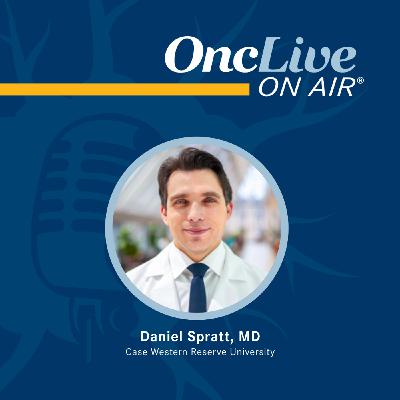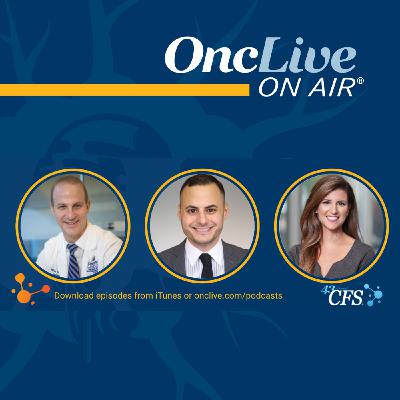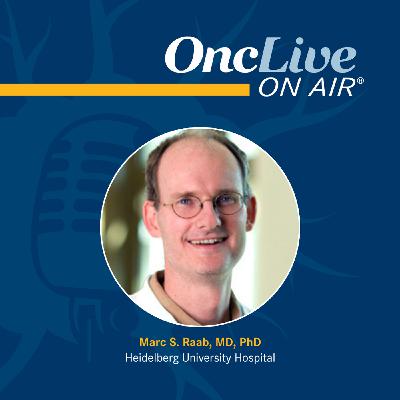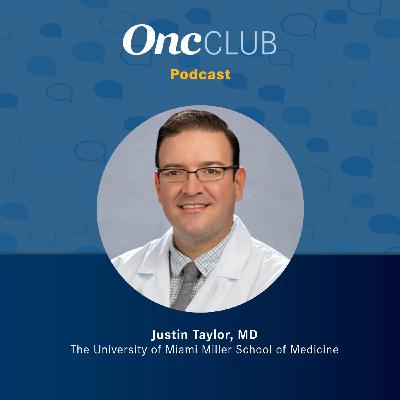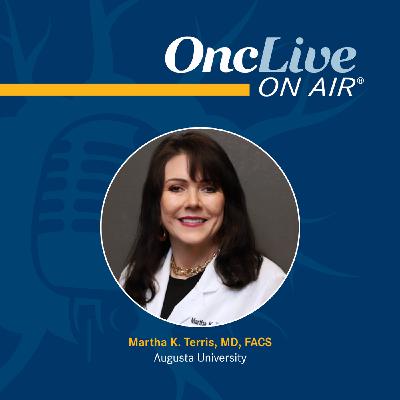Discover OncLive® On Air
OncLive® On Air

OncLive® On Air
Author: OncLive® On Air
Subscribed: 111Played: 5,319Subscribe
Share
Description
In OncLive® On Air, you can expect to hear interviews with academic oncologists on the thought-provoking oncology presentations they give at the OncLive® State of the Science Summits. The topics in oncology vary, from systemic therapies, surgery, radiation therapy, to emerging therapeutic approaches in a particular type of cancer. This includes lung cancer, breast cancer, gastrointestinal cancers, hematologic malignancies, gynecologic cancers, genitourinary cancers, and more.
722 Episodes
Reverse
Welcome to OncLive On Air®!
OncLive On Air is a podcast from OncLive®, which provides oncology professionals with the resources and information they need to provide the best patient care. In both digital and print formats, OncLive covers every angle of oncology practice, from new technology to treatment advances to important regulatory decisions.
In today’s episode, we had the pleasure of speaking with Cassie Kline, MD, MAS, about updated efficacy data from the phase 2 FIREFLY-1 study (NCT04775485) of tovorafenib (Ojemda) in patients with relapsed/refractory pediatric low-grade glioma (pLGG) that were presented at the 2025 Society of Neuro-Oncology Annual Meeting. Dr Kline is an attending physician and director of Clinical Research in the Department of Neuro-Oncology at Children's Hospital of Philadelphia in Pennsylvania.
In our exclusive interview, Dr Kline discussed longer-term efficacy and safety data from the trial, noting the sustained response rates, continued tumor shrinkage, and rates of patients who remained treatment free after approximately 36 months of follow-up.
_____
That’s all we have for today! Thank you for listening to this episode of OncLive On Air. Check back throughout the week for exclusive interviews with leading experts in the oncology field.
For more updates in oncology, be sure to visit www.OncLive.com and sign up for our e-newsletters.
OncLive is also on social media. On X and BlueSky, follow us at @OncLive. On Facebook, like us at OncLive, and follow our OncLive page on LinkedIn.
If you liked today’s episode of OncLive On Air, please consider subscribing to our podcast on Apple Podcasts, Spotify, and many of your other favorite podcast platforms,* so you get a notification every time a new episode is posted. While you are there, please take a moment to rate us!
Thanks again for listening to OncLive On Air.
*OncLive On Air is available on: Apple Podcasts, Spotify, CastBox, Podcast Addict, Podchaser, RadioPublic, and TuneIn.
This content is a production of OncLive; this OncLive On Air podcast episode is supported by funding, however, content is produced and independently developed by OncLive.
In today’s episode, we had the pleasure of speaking with Daniel Spratt, MD, chair and professor in the Department of Radiation Oncology at Case Western Reserve University School of Medicine and a member of the Case Comprehensive Cancer Center in Cleveland, Ohio. Dr Spratt discussed key updates to the National Comprehensive Cancer Network (NCCN) Guidelines for prostate cancer, including how advances in molecular imaging, evolving systemic therapy options, and the integration of next-generation androgen deprivation therapy (ADT) are reshaping treatment recommendations across localized, recurrent, and advanced disease settings.
In today’s episode,filmed live at the 43rd Annual CFS Chemotherapy Foundation Symposium, lung cancer expert Benjamin P. Levy, MD, hosted a cross-specialty discussion with breast cancer experts Kamel Abou Hussein, MD, and Victoria Rizk, MD, about the rapidly evolving therapeutic landscape in breast cancer. Dr Levy is the clinical director of medical oncology at the Johns Hopkins Sidney Kimmel Cancer Center at Sibley Memorial Hospital and an associate professor of oncology at the Johns Hopkins University School of Medicine in Washington, DC. Dr Abou Hussein is co-director of the Janet Knowles Breast Cancer, director of Breast Medical Oncology, and director of Breast Cancer Clinical Trials at Cooper University Health Care; as well as an assistant professor of medicine at Cooper Medical School of Rowan University in Camden, New Jersey. Dr Rizk is a medical oncologist at Tampa General Hospital Cancer Institute in Florida.
In today’s episode, we had the pleasure of speaking with Marc S. Raab, MD, about the post-induction outcomes and updated minimal residual disease (MRD) analyses from the phase 2 MajesTEC-5 study (NCT05695508), which is evaluating teclistamab-cqyv (Tecvayli)–based induction regimens in patients with newly diagnosed multiple myeloma. Dr Raab is a professor of medicine at Heidelberg University in Germany.
Welcome to OncLive On Air®!
OncLive On Air is a podcast from OncLive®, which provides oncology professionals with the resources and information they need to provide the best patient care. In both digital and print formats, OncLive covers every angle of oncology practice, from new technology to treatment advances to important regulatory decisions.
In today’s episode, we had the pleasure of speaking with Harry P. Erba, MD, PhD, about the FDA approval of ziftomenib (Komzifti) for the treatment of adult patients with relapsed/refractory acute myeloid leukemia (AML) with a susceptible NPM1 mutation who have no satisfactory alternative treatment options. Dr Erba is a professor of medicine in the Division of Hematologic Malignancies and Cellular Therapy in the Department of Medicine at the Duke University School of Medicine, as well as director of the Leukemia Program and director of Phase I Development in Hematologic Malignancies. He is also a member of the Duke Cancer Institute in Durham, North Carolina.
In our exclusive interview, Dr Erba discussed the significance of this approval, key efficacy and safety findings from the pivotal phase 1/2 KOMET-001 trial (NCT04067336), and the role ziftomenib may play throughout the evolution of the AML treatment paradigm.
_____
That’s all we have for today! Thank you for listening to this episode of OncLive On Air. Check back throughout the week for exclusive interviews with leading experts in the oncology field.
For more updates in oncology, be sure to visit www.OncLive.com and sign up for our e-newsletters.
OncLive is also on social media. On X and BlueSky, follow us at @OncLive. On Facebook, like us at OncLive, and follow our OncLive page on LinkedIn.
If you liked today’s episode of OncLive On Air, please consider subscribing to our podcast on Apple Podcasts, Spotify, and many of your other favorite podcast platforms,* so you get a notification every time a new episode is posted. While you are there, please take a moment to rate us!
Thanks again for listening to OncLive On Air.
*OncLive On Air is available on: Apple Podcasts, Spotify, CastBox, Podcast Addict, Podchaser, RadioPublic, and TuneIn.
This content is a production of OncLive; this OncLive On Air podcast is supported by funding, however, content is produced and independently developed by OncLive.
In today’s episode, we had the pleasure of speaking with Justin Taylor, MD, an associate professor in the Division of Hematology at the University of Miami Miller School of Medicine, about the growing role of artificial intelligence in cancer information–seeking and what this means for clinicians caring for patients with hematologic malignancies. Dr Taylor’s recent work explores how patients are increasingly turning to AI tools to better understand their diagnoses and treatments, and why oncologists must be aware of the accuracy, limitations, and clinical implications of these technologies.
Closing the Gap: Understanding Gender Disparities in Bladder Cancer Care, hosted by Martha K. Terris, MD, FACS, is a limited series spotlighting unique considerations for bladder cancer diagnosis and treatment among women. Dr Terris is department chair and a professor in the Department of Urology, the Witherington Distinguished Chair in Urology, and co-director of the Cancer Center at the Medical College of Georgia at Augusta University.
In the final part of this 3-part series, Dr Terris discussed how the early diagnosis of bladder cancer presents a significant challenge, particularly in female patients, who are frequently diagnosed at a later stage of the disease and subsequently respond less favorably to treatment modalities. A crucial component of early detection is the rigorous evaluation of hematuria, she emphasized. Microhematuria is defined strictly by microscopy. Reliance solely on a dipstick test is insufficient; any positive dipstick result necessitates a microscopic examination, she explained. Furthermore, patients currently receiving anticoagulation therapy do not bypass the standard workup, she noted. If hematuria is identified alongside a urinary tract infection or gynecological issue, the urine should be rechecked once the co-existing problem has cleared, she advised.
Risk assessment must consider both common and less-recognized factors, particularly in women, according to Terris. Standard risks include exposure to cyclophosphamide or ifosfamide, Lynch syndrome, chronic indwelling Foley catheters, benzene/aromatic amine exposure, and smoking, she added. However, uro-oncologists must actively assess female patients for occupational exposures not traditionally associated with bladder cancer, she said.
Patients presenting with microhematuria should be stratified into low-, intermediate-, or high-risk groups, Terris continued. The gold standard evaluation for high-risk patients is a cystoscopy and CT urogram, she reported. The CT urogram involves cross-sectional imaging of the abdomen and pelvis with and without contrast, incorporating delayed images to optimally visualize the renal pelvis and ureters for potential filling defects, she noted. If patients cannot tolerate contrast, an MR urogram is the primary alternative, she stated. If neither CT nor MR urogram can be performed, the default workup is non-contrast CT combined with cystoscopy and retrograde pyelograms, although this requires general anesthesia, she explained. Given that women are often diagnosed with bladder cancer late and face poor outcomes with advanced disease, maintaining a heightened awareness and low threshold for investigation is critical, Terris concluded.
In today’s episode, filmed live at the 43rd Annual Chemotherapy Foundation Symposium, lung cancer expert Benjamin P. Levy, MD, hosted an in-depth discussion with Jonathan W. Lee, MD, MSc, on the evolving therapeutic landscape for EGFR-mutant and HER2-positive non–small cell lung cancer (NSCLC). Dr Levy is the clinical director of medical oncology at the Johns Hopkins Sidney Kimmel Cancer Center at Sibley Memorial Hospital and an associate professor of oncology at the Johns Hopkins University School of Medicine in Washington, DC. Dr Lee is the chief oncology/hematology fellow at Weill Cornell Medicine in New York, New York.
In today’s episode, filmed live at the 43rd Annual Chemotherapy Foundation Symposium, lung cancer expert Benjamin P. Levy, MD, hosted a cross-specialty discussion with genitourinary (GU) cancer expert Scott T. Tagawa, MD, MS, FACP, FASCO, about the rapidly evolving treatment paradigms for prostate and kidney cancer. Dr Levy is the clinical director of medical oncology at the Johns Hopkins Sidney Kimmel Cancer Center at Sibley Memorial Hospital and an associate professor of oncology at the Johns Hopkins University School of Medicine in Washington, DC. Dr Tagawa is a professor of medicine and urology at Weill Cornell Medicine, as well as an attending physician at NewYork-Presbyterian – Weill Cornell Medical Center in New York, New York.
Their conversation began with a focus on prostate-specific membrane antigen (PSMA)–positive prostate cancer. Dr Tagawa explained that PSMA is a cell surface protein, and that PSMA imaging agents are commonly used to assess biochemical recurrence and perform initial disease staging. He noted that therapy-related adverse effects are often site-specific, including dry mouth/change in taste, and myelosuppression from the radiation payload. For monitoring long-term safety, Dr Tagawa emphasized that renal function must be tracked. Beyond PSMA, other prostate cancer targets include TROP-2, B7-H3, and markers specific to aggressive or neuroendocrine variants, such as DLL3, he reported.
In advanced GU cancers, circulating tumor DNA (ctDNA) testing is increasingly important, Dr Tagawa highlighted. In prostate cancer, ctDNA testing is used to assess homologous recombination deficiency (HRD) status and BRCA expression, he said, explaining that evidence for the use of ctDNA testing in GU cancers stems from findings with this type of assay to evaluate minimal residual disease levels in urothelial cancer. He noted that studies show that if patients with urothelial cancer become ctDNA positive within the first year of receiving neoadjuvant chemotherapy, they benefit from treatment with atezolizumab (Tecentriq). Similarly, he stated that patients with previously untreated HRD-positive metastatic prostate cancer also see a progression-free survival benefit when a PARP inhibitor is added to an androgen deprivation therapy/androgen receptor pathway inhibitor backbone.
Shifting the conversation to the management of frontline advanced clear cell renal cell carcinoma (RCC), the experts reviewed standard approaches, which involve an immune-oncology (IO) agent plus either a CTLA-4 inhibitor or a VEGF TKI. Tagawa noted that IO/VEGF TKI combinations may be preferred for symptomatic patients needing a rapid response, whereas IO/IO combinations may offer greater potential for treatment cessation. He brought up a key distinction in RCC, which is that re-instituting PD-1/PD-L1 inhibition upon progression in the metastatic setting has generally shown no benefit.
Dr Levy brought a broad scope to the GU cancer discussion through his lung cancer expertise, introducing parallels between the treatment paradigms. The interview provided an opportunity to show the importance of creating connections across oncology specialties to bring nuanced perspectives to future advances in clinical research and patient care.
From Discovery to Delivery: Charting Progress in Gynecologic Oncology, hosted by Ursula A. Matulonis, MD, brings expert insights into the most recent breakthroughs, evolving standards, and emerging therapies across gynecologic cancers. Dr Matulonis is chief of the Division of Gynecologic Oncology and the Brock-Wilcon Family Chair at the Dana-Farber Cancer Institute and a professor of medicine at Harvard Medical School, both in Boston, Massachusetts.
In this inaugural episode, Dr Matulonis welcomed guest Taymaa May, MD, MSc, to discuss advances in gynecologic cancer surgery. Dr May is the director of Ovarian Cancer Surgery in the Division of Surgical Oncology at the Brigham and Women’s Hospital in Boston, as well as an associate professor at Harvard Medical School.
One of the biggest transformative changes in the field has been the introduction of minimally invasive surgery using laparoscopic and robotic platforms, Dr May emphasized. This allows for precise cancer staging surgery and faster patient recovery without compromising cancer outcomes, she noted. Complementing this has been the innovation of sentinel lymph node mapping, which uses technology, such as an infrared dye, to precisely identify and remove only the necessary lymph nodes. This offers equal staging precision and reduces patient morbidity with lower extremity lymphedema, a common adverse effect associated with older, extensive lymph node dissections, according to Dr May.
The experts stressed the importance of consulting a gynecologic oncology surgeon, as national studies indicate that patients assessed and operated on by these specialists achieve the most optimal clinical outcomes. For advanced ovarian cancer, which often requires complex multivisceral resection to achieve optimal tumor removal, Dr May explained that surgical innovations are used to enhance recovery. For example, she noted that fluorescence angiography assesses blood flow in fresh bowel sutures intraoperatively, which helps ensure proper healing and minimizes complications.
In cervical cancer, Dr May said that radical trachelectomy offers a safe, fertility-preserving option for young patients with suitable tumors. Furthermore, when determining treatment for patients with advanced ovarian cancer, she emphasized that personalization is key. Ultimately, Drs Matulonis and May reported that integrating surgical innovation into gynecologic cancer treatment protocols ensures optimal recovery, which is critical for patients to start subsequent treatments, like chemotherapy, on time.
Closing the Gap: Understanding Gender Disparities in Bladder Cancer Care, hosted by Martha K. Terris, MD, FACS, is a limited series spotlighting unique considerations for bladder cancer diagnosis and treatment among women. Dr Terris is department chair and a professor in the Department of Urology, the Witherington Distinguished Chair in Urology, and co-director of the Cancer Center at the Medical College of Georgia at Augusta University.
In part 2 of this 3-part series, Dr Terris discussed the disparities in treatment and outcomes for women with bladder cancer. Although bladder cancer is less common in females than in males, female patients tend to have significantly worse outcomes, Terris explained. Delayed diagnosis is a contributing factor, but the exact reasons for the poorer prognosis are not fully understood, she emphasized.
Treatment difficulties begin surgically, according to Terris. From a surgical perspective, she noted that, performing a cystectomy on a woman is more challenging due to factors like pelvic varicosities and differing fat distribution, which complicate stoma creation.
In terms of medical treatment, Terris also explained that women exhibit worse tolerability and higher rates of discontinuation of immunotherapy, and that they often experience poor efficacy outcomes regardless of whether they complete the course of treatment. These differences between men and women may be linked to factors such as hormonal influences or antibody introduction during pregnancy. Conversely, classic cisplatin-based neoadjuvant chemotherapy followed by radical cystectomy have been shown to have similar overall survival and disease-free survival in eligible female and male patients.
Biologically, Terris also reported that tumors in women may exhibit more effective immune escape mechanisms, possibly connected to differences in the bladder microbiome. The presence of bacteria in bladder tumors has been found to be enriched in patients who did not respond to neoadjuvant chemotherapy, which is relevant as women are more prone to bladder colonization, she added. Overall, Terris emphasized that oncologists must be aggressive in treating women with bladder cancer, despite surgical complexities, and highlighted that early detection is key.
Two Onc Docs, hosted by Samantha A. Armstrong, MD, and Karine Tawagi, MD, is a podcast dedicated to providing current and future oncologists and hematologists with the knowledge they need to ace their boards and deliver quality patient care. Dr Armstrong is a hematologist/oncologist and assistant professor of clinical medicine at Indiana University Health in Indianapolis. Dr Tawagi is a hematologist/oncologist and assistant professor of clinical medicine at the University of Illinois in Chicago.
In this episode, OncLive On Air® partnered with Two Onc Docs to review exciting updates from the 2025 ESMO Congress about bladder cancer management that have the potential to change guidelines. In non–muscle-invasive bladder cancer (NMIBC), 2 trials added immunotherapy to BCG. The phase 3 POTOMAC trial (NCT03528694) combining durvalumab (Imfinzi) with BCG for high-risk, BCG-naive NMIBC was positive, demonstrating improved disease-free survival with the combination. This regimen might become a new standard of care and could reduce the need for early radical cystectomy, the experts highlighted.
For muscle-invasive bladder cancer, the phase 3 KEYNOTE-905 study (NCT03924895) combined perioperative enfortumab vedotin-ejfv (Padcev) and pembrolizumab (Keytruda) for cisplatin-ineligible patients. This positive trial demonstrated strong event-free survival and overall survival (OS) with the combination. Furthermore, the phase 3 IMvigor011 trial (NCT04660344) provided data on a risk-adapted approach using adjuvant atezolizumab (Tecentriq) for post-cystectomy patients with circulating tumor DNA (ctDNA)–positive disease. For these patients, atezolizumab generated benefits in disease-free survival and OS, supporting the future use of ctDNA for personalized therapy.
Updates in metastatic bladder cancer emphasized the importance of testing for FGFR alterations and HER2 expression in the second-line setting, Armstrong and Tawagi explained. The phase 1 FORAGER-1 study (NCT05614739) showed the efficacy of an oral FGFR3 inhibitor in heavily pretreated patients and showed lower rates of hypophosphatemia with the agent compared with erdafitinib (Balversa). Overall, the conference yielded many new and exciting data points for the treatment of patients with bladder cancer.
In today’s episode, we had the pleasure of speaking with Kevin Kalinsky, MD, MS, FASCO, about the evolving treatment paradigm for hormone receptor (HR)–positive breast cancer post-CDK4/6 inhibition, as well as the need for more advanced therapies to improve patient outcomes in this setting. Dr Kalinsky is a professor and director in the Division of Medical Oncology of the Department of Hematology and Medical Oncology at Emory University School of Medicine, as well as the director of the Glenn Family Breast Center and the Louisa and Rand Glenn Family Chair in Breast Cancer Research at Winship Cancer Institute in Atlanta, Georgia.
In our exclusive interview, Dr Kalinsky discussed combination therapies that have shown promise for the management of HR-positive breast cancer following endocrine therapy, factors influencing treatment selection for patients who have received prior CDK4/6 inhibition, best practices for genomic testing in this population, and breast cancer research highlights from the 2025 ESMO Congress.
In today’s episode, we had the pleasure of speaking with Stephen Liu, MD, about the potential role for zidesamtinib (NVL-520) for the treatment of patients with advanced non–small cell lung cancer (NSCLC) harboring ROS1 rearrangements. Dr Liu is an associate professor of medicine at Georgetown University, as well as the director of Thoracic Oncology and head of Developmental Therapeutics at the Georgetown Lombardi Comprehensive Cancer Center in Washington, DC.
In our exclusive interview, Dr Liu discussed the current standards and challenges for treating patients with ROS1-positive disease, the unique mechanism of action of zidesamtinib, and how positive findings from the phase 1/2 ARROS-1 trial (NCT05118789) may help position this agent in the ROS1-positive NSCLC treatment paradigm.
Dr Mian discussed why frailty should be understood as a dynamic, evolving clinical state rather than a fixed baseline characteristic
In today’s episode, we had the pleasure of speaking with Sikander Ailawadhi, MD, and Beth Faiman, PhD, MS, APN-BC, BMTCN, AOCN, FAAN, FAPO, about the potential clinical implications of the phase 3 IRAKLIA (NCT05405166) and phase 2 IZALCO (NCT05704049) studies, which investigated the use of isatuximab-irfc (Sarclisa) administered via an on-body delivery system in patients with relapsed/refractory multiple myeloma. Ailawadhi is a consultant in the Division of Hematology/Oncology in the Department of Internal Medicine, a consultant in the Department of Cancer Biology, and a professor of medicine at Mayo Clinic in Jacksonville, Florida. Faiman is a nurse practitioner in the Multiple Myeloma Program at Cleveland Clinic in Ohio.
In our exclusive interview, Ailawadhi and Faiman discussed the rationale for efforts to bring isatuximab on-body injectors into the clinic, key patient-reported outcome findings from these studies, and how these findings may one day influence therapy administration across the broader multiple myeloma treatment paradigm.
Closing the Gap: Understanding Gender Disparities in Bladder Cancer Care, hosted by Martha K. Terris, MD, FACS, is a limited series spotlighting unique considerations for bladder cancer diagnosis and treatment among women. Dr Terris is department chair and a professor in the Department of Urology, the Witherington Distinguished Chair in Urology, and co-director of the Cancer Center at the Medical College of Georgia at Augusta University.
In part 1 of this 3-part series, Dr Terris discussed the prevalence of bladder cancer in women, as well as reasons for diagnostic disparities that contribute to poor treatment outcomes. She noted that this disease is often diagnosed at later stages in women than in men, often resulting in diagnoses of more advanced disease and translating to poorer outcomes. She added that although female patients represent a minority of those with urothelial carcinoma, retrospective data indicate that women tend to be diagnosed at later stages and consequently experience worse survival rates, regardless of the disease stage.
Dr Terris identified several theories explaining why this diagnosis delay occurs. One possible reason is patient-related: women may be less likely than men to consult a physician when they notice blood in their urine because they may be conditioned to dismiss blood if they experience menstrual bleeding. However, physician behavior and bias also contribute to diagnostic disparities, Terris said. Women with suspected hematuria typically receive fewer imaging tests, she continued. Additionally, physicians may be biased, attributing hematuria to uterine bleeding, menstruation, or other benign causes.
Overall, Terris emphasized that early detection is key. If there is any suspicion of a malignancy, patients should be referred directly to a urologist, she stated. Urologists should be willing to work up cases that might ultimately be recurrent urinary tract infections or radiation cystitis to avoid undiagnosed cases of bladder cancer in women, she concluded.
At the 2025 ESMO Congress, leading oncologists reflected on data expected to redefine practice across breast, genitourinary, and gynecologic malignancies.
In today’s episode, we had the pleasure of speaking with Neal Shore, MD, FACS, about the use of androgen deprivation therapy (ADT) in prostate cancer management. Dr Shore is medical director of the Carolina Urologic Research Center in Myrtle Beach, South Carolina.
In our exclusive interview, Dr Shore discussed guidelines for incorporating ADT into prostate cancer clinical practice, toxicities and quality-of-life complications associated with this class of agents that health care providers should be aware of and try to mitigate, and the importance of shared decision-making between members of the multidisciplinary team, as well as patients.
In this episode, Ziad Hanhan, MD, hosted a discussion about lung cancer diagnosis, surgical management, and evolving treatment paradigms. Dr Hanhan is a thoracic surgeon at Hackensack Meridian Health, chairman of Surgery at Bayshore Medical Center in Holmdel, New Jersey, and chief of Thoracic Surgery at Riverview Medical Center in Red Bank, New Jersey. He was joined by:
Thomas Bauer, MD, the chair of surgery at Jersey Shore University Medical Center in Neptune Township, New Jersey, and Hackensack Meridian Health School of Medicine
Rachel NeMoyer, MD, a thoracic surgeon at Hackensack Meridian Health
Drs Hanhan, Bauer, and NeMoyer discussed current standards and future directions in thoracic oncology, emphasizing multidisciplinary collaboration and technological innovation. The conversation opened with an overview of lung cancer epidemiology, and the experts noted that this disease remains the leading cause of cancer-related mortality in both men and women. They explained that approximately 90% of lung cancer cases are attributable to tobacco use, making cessation a key preventive measure. They also emphasized that early detection through low-dose CT screening improves outcomes when the disease is identified at an early stage. However, despite these advances, they stated that most lung cancer cases in the United States continue to be diagnosed at stage III or IV, underscoring the need for improved screening adherence.
They expanded on current lung cancer screening guidelines and noted that lung cancer often presents with nonspecific symptoms, such as chronic cough or hemoptysis, and that many cases are discovered incidentally on imaging. The surgeons also discussed diagnostic strategies for pulmonary nodules and emphasized a patient-tailored approach that balances diagnostic yield with procedural risk. They also acknowledged that emerging modalities, such as liquid biopsy and breath-based DNA detection, are promising but still investigational.
They underscored that frailty assessment remains integral to surgical candidacy determination, with both clinical evaluation and pulmonary function testing guiding decision-making. The team also highlighted the role of multidisciplinary tumor boards in integrating surgical, medical, and radiation oncology perspectives. For early-stage disease, surgery remains the standard, whereas patients with stage III disease typically receive neoadjuvant therapy incorporating immuno-oncology agents. The group also discussed expanding surgical indications in select stage IV cases, reflecting improved survival associated with immunotherapy.



